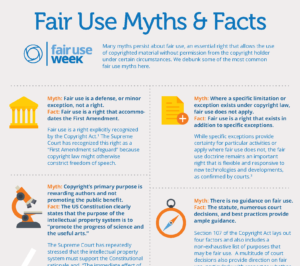 [Reposted from Assoc. of Research Libraries, Link (CC-BY)] The fourth annual Fair Use/Fair Dealing Week took place February 20–24, 2017, growing to 140 organizations—as well as numerous individuals—celebrating the important and flexible doctrines of fair use and fair dealing. This year’s event was organized by the Association of Research Libraries (ARL) and participants included universities, libraries, library associations, and many other organizations, such as Authors Alliance, Creative Commons, the Electronic Frontier Foundation, Public Knowledge, the R Street Institute, and Re:Create. Forty-five ARL member institutions contributed a wide range of resources this year. Fair Use/Fair Dealing Week was observed worldwide, with participants in such countries as Australia, Canada, Colombia, Israel, Korea, the Netherlands, New Zealand, and the United States.
[Reposted from Assoc. of Research Libraries, Link (CC-BY)] The fourth annual Fair Use/Fair Dealing Week took place February 20–24, 2017, growing to 140 organizations—as well as numerous individuals—celebrating the important and flexible doctrines of fair use and fair dealing. This year’s event was organized by the Association of Research Libraries (ARL) and participants included universities, libraries, library associations, and many other organizations, such as Authors Alliance, Creative Commons, the Electronic Frontier Foundation, Public Knowledge, the R Street Institute, and Re:Create. Forty-five ARL member institutions contributed a wide range of resources this year. Fair Use/Fair Dealing Week was observed worldwide, with participants in such countries as Australia, Canada, Colombia, Israel, Korea, the Netherlands, New Zealand, and the United States.
Throughout the week, participants celebrated the essential limitations and exceptions to copyright that fair use and fair dealing provide, allowing the use of copyrighted materials without permission from the copyright holder under certain circumstances. While fair use and fair dealing are employed on a daily basis, Fair Use/Fair Dealing week provides a time to promote and discuss the opportunities presented, share successful stories, and explain these doctrines.
Each day, new blog posts and other resources were produced and shared and institutions hosted a variety of live events, such as panel discussions, film screenings, button- and card-making stations, and more. Daily roundups and additional resources are available on the Fair Use/Fair Dealing Week website. There were over 100 news and blog posts, 13 videos, 3 infographics, and 2 podcasts shared over the week. Below are some highlights.
Fair Use/Fair Dealing Week 2018 will take place February 26–March 2. Plan to participate!
Resources
The Association of Research Libraries released the infographic, “Fair Use Myths and Facts.”
The University of Waterloo adapted ARL’s infographic for Canada to create, “Fair Dealing Myths and Facts.”
Kyle Courtney, Jackie Roche, and Sarah Searle of Harvard University published the comic book, “Fair Use of Unpublished Works.”
Video/Audio
Three ARL libraries created videos celebrating fair use, including Harvard University, Duke University, and the University of Virginia. Additionally, Brigham Young University created a video encouraging visits to the university’s Copyright Licensing Office to learn more about fair use.
The Association of College and Research Libraries has posted a video of its live webcast featuring Lillian Rigling and Will Cross of NCSU Libraries explaining “Using Fair Use to Preserve and Share Disappearing Government Information: A Guide for Rogue Librarians.”
Public Knowledge created a fun, mash-up, parody video, “Let Them Go: A Copyright Policy Song” with an accompanying blog post.
The Center for Media & Social Impact created this “Fair Use Video Code: Documentary Filmmakers’ Statement of Best Practices.”
Re:Create released the fourth episode of its Copy This podcast, this one featuring Corynne McSherry of the Electronic Frontier Foundation on “Fair Use: You Use It More Than You Realize.”
News/Blog Posts
The Canadian Association of Research Libraries (CARL) released a statement supporting Fair Use/Fair Dealing Week 2017.
Jim Neal, president-elect of the American Library Association and university librarian emeritus at Columbia University, wrote the editorial “Balance is Everything,” which was published in The Hill.
Harvard posted new blog posts each day of the week, as did the Center for Media & Social Impact. ARL Policy Notes, Authors Alliance, Dalhousie University, Duke University, Electronic Frontier Foundation, and Penn State University were among other organizations that also posted several times.
Michael Geist of the University of Ottawa covered fair dealing extensively in his post “The Copyright Lobby’s IIPA Report: Fake News about the State of Canadian Copyright.”
Ann Ludbrook of Ryerson University explained the importance of celebrating Fair Dealing Week in the context of the Canadian Copyright Review 2017.
About the Association of Research Libraries
The Association of Research Libraries (ARL) is a nonprofit organization of 124 research libraries in the US and Canada. ARL’s mission is to influence the changing environment of scholarly communication and the public policies that affect research libraries and the diverse communities they serve. ARL pursues this mission by advancing the goals of its member research libraries, providing leadership in public and information policy to the scholarly and higher education communities, fostering the exchange of ideas and expertise, facilitating the emergence of new roles for research libraries, and shaping a future environment that leverages its interests with those of allied organizations. ARL is on the web at ARL.org.




